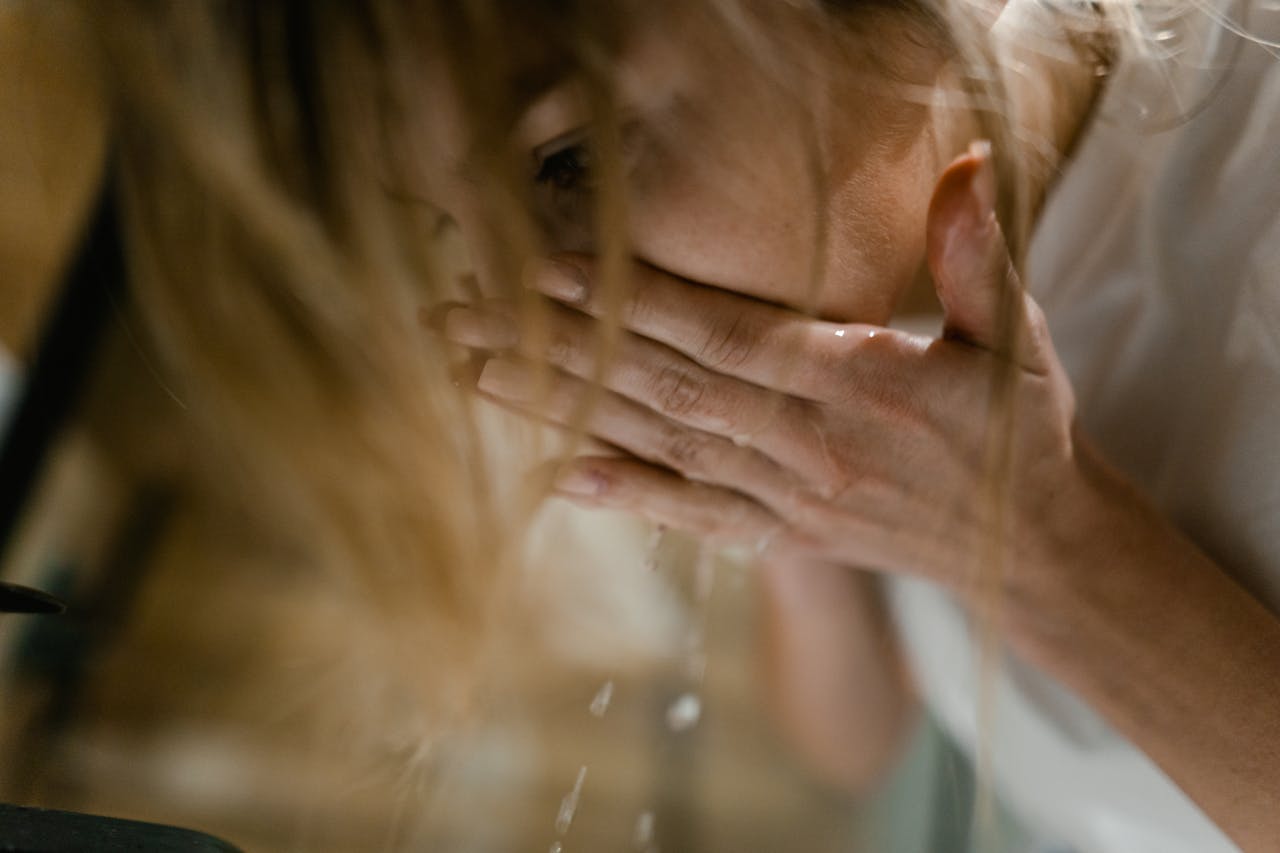Meaning of Left Hand Tingling According to Primbon: Myth or Fact?
Learn the meaning of left hand tingling according to Javanese primbon and its medical explanation. Check out the causes, how to deal with it, and when to see a doctor.


Washing the face is a daily routine performed by most people. However, did you know that in Javanese tradition, washing the face has a deeper meaning, especially when associated with primbon? Let’s explore further about the tradition of washing the face with primbon water, its meaning in Javanese culture, and its benefits for skin health.

wash face (credit: pexels.com)
Washing the face with primbon water is a traditional practice in Javanese culture that involves the use of water that has been infused with special prayers or mantras. This water is believed to possess spiritual power that can cleanse not only physical dirt but also negative energy that may cling to a person.
In this context, "primbon" refers to a collection of traditional Javanese knowledge that encompasses various aspects of life, including rituals and spiritual practices. Primbon water is usually prepared by someone who is considered to have spiritual knowledge, such as a shaman or village elder.
This practice is not merely a hygiene routine, but rather a ritual that combines physical and spiritual aspects. It is believed that by washing the face with primbon water, one not only cleanses their face but also purifies their soul and mind.
The tradition of washing the face with primbon water has deep roots in Javanese culture. This practice has existed for centuries, becoming an integral part of the belief system and rituals of ancient Javanese society.
The origins of this tradition can be traced back to the pre-Islamic era in Java, where animism and dynamism beliefs were still strong. At that time, water was considered a sacred element that had the power to cleanse and purify, not only physically but also spiritually.
As time went on, this practice adapted to the influence of Islam entering Java. Islamic elements, such as prayers in Arabic, began to be integrated into the rituals of preparing primbon water. This reflects the syncretism that characterizes Javanese culture, where local beliefs blend with the teachings of the newly introduced religion.
In its development, this tradition is not only used for daily needs but also becomes an important part of various Javanese ceremonies. For example, in wedding rituals or before undertaking important journeys, washing the face with primbon water is often done as a form of self-purification and a plea for protection.
The making of primbon water for washing the face is a meaningful process that is usually done with great care. Although the method of preparation may vary depending on local traditions and families, here are the general steps in making primbon water:
It is important to note that the process of making primbon water is very personal and can vary between families or communities. Some people may add additional steps or use special ingredients according to their beliefs.

face wash (credit: pexels.com)
The tradition of washing the face with primbon water has deep meaning and philosophy in Javanese culture. This practice is not merely a ritual of cleanliness but reflects the worldview and spiritual values of the Javanese people. Here are some meanings and philosophies behind this tradition:
The philosophy behind this practice also reflects the Javanese concept of "rasa" - a subtle sensitivity to the spiritual aspects of life. By washing the face with primbon water, one is considered to sharpen this "rasa," enhancing sensitivity to spiritual and metaphysical matters.
Furthermore, this tradition can also be viewed as a form of "laku" or spiritual discipline in Javanese culture. Performing this ritual consistently is regarded as a form of spiritual practice that can bring one closer to self-understanding and the universe.
Although the tradition of washing the face with primbon water is rooted in spiritual beliefs, some aspects of this practice may have real benefits for skin health. Here are some potential benefits that can be gained:
It is important to note that these benefits are more potential in nature and have not been supported by rigorous scientific research. However, many users of primbon water report feeling fresh and clean after using it, which can be attributed to the combination of the physical effects of the water and flowers, as well as the psychological effects of the ritual itself.
Nevertheless, it is important to remain cautious, especially for those with sensitive skin or allergies to certain flowers. It is always recommended to do a patch test first and consult a dermatologist if there are any doubts.
Washing the face with regular water and primbon water has several significant differences, both in practical and philosophical aspects. Here is a comparison between the two:
These differences reflect that washing the face with primbon water is not just about physical cleanliness, but also a profound spiritual and cultural practice. While washing the face with regular water is a simple daily routine, the use of primbon water involves more complex rituals and beliefs.

face wash (credit: pexels.com)
In Javanese tradition, the choice of time to wash the face with primbon water is considered important and can affect the effectiveness and meaning of the ritual. Here are some times that are considered appropriate for this practice:
It is important to note that the choice of timing can vary depending on specific family or community traditions. Some people may choose to perform this ritual routinely every day, while others may only do it on special occasions.
In a modern context, many people who still value this tradition may adjust the timing of its practice to fit their busy lifestyles. The most important thing is the intention and spiritual focus when performing the ritual, more than just literal punctuality.
The tradition of washing the face with primbon water has given rise to various myths and beliefs. Here are some common myths along with their facts or scientific explanations:
Fact: There is no scientific evidence supporting this claim. However, this ritual can provide positive psychological effects that help a person feel more confident and optimistic.
Fact: Although some natural ingredients in primbon water may have benefits for the skin, there is no scientific evidence showing significant anti-aging effects. Consistent skincare and a healthy lifestyle play a bigger role in maintaining skin health and beauty.
Fact: The quality of the water and the ingredients used are more important than who makes it. However, a person's beliefs and convictions can influence their perception of the effectiveness of primbon water.
Fact: Although some natural ingredients in primbon water may have anti-inflammatory or antibacterial properties, there is no scientific evidence supporting its use as a treatment for skin diseases. Consulting a dermatologist is still necessary for serious skin issues.
Fact: From a scientific perspective, the quality of the water and the natural ingredients within it can indeed change over time. However, the "spiritual power" believed to exist in primbon water is more subjective and personal.
It is important to understand that many aspects of the tradition of washing the face with primbon water are more cultural and spiritual than scientific. Nevertheless, this ritual can have real psychological and emotional benefits for those who believe in it, such as providing a sense of tranquility and connection to cultural heritage.
From a medical perspective, washing the face with primbon water has not yet had strong scientific evidence to support its traditional claims. However, some aspects of this practice may have certain benefits for skin health. Here is a medical view on some aspects of washing the face with primbon water:
Washing the face with clean water, whether it is primbon water or regular water, is a good practice for skin health. Clean water helps remove dirt, excess oil, and dead skin cells.
Some flowers or spices used in primbon water, such as roses or jasmine, may have anti-inflammatory or antioxidant properties that could be beneficial for the skin. However, the effects may be minimal and have not been clinically proven.
From a psychosomatic standpoint, a person's belief in the benefits of primbon water can produce a positive placebo effect. This could reduce stress, which in turn may benefit skin health.
The use of various flowers or spices in primbon water could pose a risk of allergies or skin irritation in some individuals. It is important to conduct a patch test before using primbon water regularly.
It is important to remember that washing the face with primbon water should not be considered a substitute for medical treatment for serious skin issues. Consultation with a dermatologist is still necessary for skin conditions that require medical treatment.
Overall, from a medical perspective, washing the face with primbon water may not be harmful if done correctly and using safe ingredients. However, its main benefits may be more psychological and cultural rather than medical. It is important to maintain basic skin hygiene and care, such as using an appropriate facial cleanser and sunscreen, regardless of whether one chooses to use primbon water or not.

face wash (credit: pexels.com)
Although washing the face with primbon water is a long-standing tradition, it is important to do it safely to maintain skin health. Here are some guidelines for safely washing your face with primbon water:
Ensure that the water used as the base for primbon water is clean and safe. Water from a reliable source or water that has been boiled and cooled is a good choice.
If adding flowers or spices to the primbon water, choose fresh ones that are free from pesticides. Avoid using ingredients known to cause skin irritation.
Before using primbon water on your entire face, conduct a patch test on a small area of skin to ensure there is no allergic reaction or irritation.
Use a clean container to store primbon water and make sure to clean it regularly to prevent bacterial growth.
Avoid using primbon water that has been stored for too long. Fresh water is best to avoid contamination.
When washing your face, use gentle motions. Rubbing too hard can cause skin irritation.
After washing your face with primbon water, rinse your face with clean water to ensure no residue is left behind.
If you experience redness, itching, or irritation after using primbon water, stop using it and rinse your face with clean water.
If you have specific skin conditions or sensitive skin, consult a dermatologist before starting a routine of washing your face with primbon water.
Remember that washing your face with primbon water should complement, not replace, a medically recommended skincare routine.
By following these guidelines, you can enjoy the tradition of washing your face with primbon water while still maintaining the health and safety of your skin. It is important to listen to your body and stop use if any unwanted reactions occur.
Although the tradition of washing the face with primbon water has rich cultural value, many people seek modern alternatives that can provide similar benefits for skin care. Here are some alternatives to consider:
Micellar water is a gentle facial cleanser that contains microscopic oil molecules that can cleanse dirt and oil without irritating the skin. This can be a good alternative for gently cleansing the face.
Hydrosol is a byproduct of the essential oil distillation process. Flower hydrosols, such as rose or lavender, can provide soothing and refreshing benefits to the skin, similar to the concept of primbon water.
Many modern cosmetic brands offer facial cleansers that contain natural ingredients such as flower or herb extracts. This can be a way to obtain the benefits of natural ingredients with a more controlled formulation.
Facial mists containing herbal or flower extracts can provide refreshing and soothing effects on the skin, similar to the concept of primbon water.
Sheet masks infused with flower or herbal extracts can provide intensive treatments that refresh and moisturize the skin.
Toners that contain herbal or flower extracts can help balance the skin's pH and provide additional benefits after cleansing the face.
Incorporating mindfulness or short meditation practices while washing the face can provide psychological benefits similar to the ritual of washing the face with primbon water.
Using facial care products that contain essential oils can provide aromatherapy benefits, which may be similar to the calming effects of primbon water.
It is important to remember that each of these alternatives has its own advantages and disadvantages. The most important thing is to find a method that suits your skin type and to be consistent in your daily skin care routine.
Although the physical benefits of washing the face with primbon water may be difficult to prove scientifically, this practice can have a positive impact on mental health. Here are some ways in which this ritual may affect psychological well-being:
The process of washing the face with primbon water can be seen as a form of mindfulness practice. Focusing on the sensation of water on the face and the aroma of flowers can help a person be present in the moment, reducing anxiety about the future or regrets about the past.
Engaging in self-care rituals like this can enhance feelings of worth and self-care. This can contribute to improved self-esteem and a positive self-image.
Soothing rituals like this can help reduce stress levels. The natural aroma of the flowers in primbon water may also have a calming effect on the nervous system.
For those with a Javanese cultural background, performing this ritual can provide a sense of connection to their cultural heritage. The feeling of being rooted and connected to tradition can offer a sense of stability and strong identity.
Having a consistent routine, such as washing the face with primbon water every morning, can provide structure and stability in daily life. This can be particularly beneficial for mental health, especially during times of uncertainty.
It is important to note that these positive effects largely stem from the ritual aspects and individual beliefs, rather than the magical nature of the primbon water itself. For those who do not have a cultural connection to this practice, similar benefits may be obtained through other self-care rituals that have personal meaning.

washing face (credit: pexels.com)
Primbon water plays a significant role in various Javanese traditional ceremonies, not limited to the daily face-washing ritual. The use of primbon water in traditional ceremonies reflects the importance of the water element in Javanese cosmology and the belief in its spiritual power. Here are some examples of the role of primbon water in Javanese traditional ceremonies:
In Javanese wedding ceremonies, primbon water is often used in the siraman ritual, where the bride and groom are bathed with water that has been blessed with prayers and certain flowers. This is considered a form of purification and spiritual preparation before entering married life.
After the birth of a baby, primbon water may be used to bathe the baby for the first time. This is believed to provide spiritual protection and bless the beginning of the baby's life.
In traditional Javanese healing practices, primbon water is often used as a medium to transfer healing energy. This water may be drunk or used to wash the affected body parts.
In the village cleansing ceremony, which aims to cleanse the village of negative energy, primbon water may be used to sprinkle certain areas in the village or to be used in cleansing rituals.
Before the planting season, some Javanese communities may use primbon water to bless agricultural land, hoping for abundant harvests.
The use of primbon water in these ceremonies reflects the Javanese belief in the power of water as a purifying element and a bearer of blessings. Primbon water is considered a mediator between the physical and spiritual worlds, facilitating communication with higher powers or ancestors.
In a modern context, although many aspects of these ceremonies have undergone changes or simplifications, the use of primbon water is still often maintained as a form of respect for tradition and cultural heritage. For many Javanese people, these rituals are not just formalities, but also a way to maintain a connection with their cultural roots and strengthen community bonds.
Although primbon water holds an important place in Javanese tradition, its use is not without controversy, especially in the context of an increasingly secular and science-oriented modern society. Here are some controversial aspects surrounding the use of primbon water:
Some religious leaders, particularly from more conservative circles, may view the use of primbon water as a form of shirk or associating partners with God. They argue that relying on the power of primbon water can diminish dependence on God.
From a scientific perspective, claims about the supernatural powers of primbon water cannot be proven. This can lead to skepticism and criticism from those who adhere to a more rational and evidence-based worldview.
Some parties may exploit the belief in primbon water for commercial gain, selling it at high prices or making exaggerated claims about its efficacy. This can be seen as exploitation of traditional beliefs.
The use of unhygienic primbon water or water containing unsafe substances can pose health risks. This is particularly concerning when primbon water is used for medicinal purposes without medical supervision.
Differences in views between older generations who may still hold firmly to tradition and younger generations who are more skeptical can lead to conflicts within families or communities.
These controversies reflect the challenges faced by many societies in balancing respect for tradition with adaptation to modern thinking. For some, the use of primbon water may be seen as a way to preserve cultural identity amidst the tides of modernization. For others, this may be considered an outdated practice that is irrelevant or even potentially harmful.
In facing this controversy, many people choose to take a more moderate approach, viewing the use of primbon water as a cultural tradition that has symbolic and psychological value, without necessarily believing in its supernatural claims. This approach allows for the preservation of valuable aspects of cultural heritage while remaining open to scientific understanding and modern developments.
In the modern era, the tradition of using primbon water has undergone various adaptations to remain relevant and acceptable to new generations. Here are some ways in which this tradition has adapted to modern life:
Some local cosmetic brands have started to incorporate the concept of primbon water into their skin care products. For example, toners or essences that contain extracts from flowers commonly used in primbon water, but produced with modern standards and scientific research.
Modern spa and wellness centers often offer treatments inspired by the primbon water tradition, combining them with modern massage techniques and aromatherapy to create a holistic experience.
Many modern spiritual practitioners reinterpret the use of primbon water as a form of meditation or mindfulness practice, focusing on the psychological and emotional aspects rather than its supernatural claims.
Some communities and cultural institutions use the primbon water tradition as a tool to educate younger generations about Javanese cultural heritage, emphasizing its philosophical and historical values rather than its mystical aspects.
There are efforts to scientifically research the potential benefits of ingredients commonly used in primbon water, such as roses or jasmine, for skin care or mental health.
These adaptations reflect efforts to bridge the gap between ancient traditions and modern needs and understandings. With this approach, the essence and values of the primbon water tradition can be preserved while making it more acceptable and beneficial in the context of contemporary life.
However, it is important to note that this adaptation process also faces challenges. There are concerns that too much modernization could strip away the spiritual and cultural essence of the original tradition. Therefore, many are striving to find a balance between innovation and preservation, ensuring that modern adaptations still respect the roots and traditional meanings of the primbon water practice.

washing face (credit: pexels.com)
Globalization has brought significant changes in the way society views and practices local traditions, including the use of primbon water. The influence of globalization on this tradition can be seen from various aspects:
With the introduction of new values and worldviews, many people, especially the younger generation, have begun to question the relevance and effectiveness of traditional practices such as the use of primbon water. This has led to a decline in interest in this tradition among certain groups.
Globalization allows for the exchange of ideas and cultural practices from various parts of the world. This has opened opportunities to compare and integrate elements of the primbon water tradition with similar practices from other cultures, creating new forms of cleansing rituals and self-care.
With the increasing global demand for tradition-based products, there is a tendency to standardize and commercialize the practice of primbon water. This can be seen in the form of skincare or spa products that claim to be inspired by this tradition but are mass-produced for the global market.
Social media platforms and digital technology have enabled the dissemination of information about the primbon water tradition to a broader audience. This can have positive impacts in terms of preservation and education, but it can also lead to simplification or misinterpretation of the tradition.
The increasing interest in cultural tourism has encouraged some regions to promote the primbon water tradition as a tourist attraction. While this can help preserve the tradition, there is a risk of excessive commercialization that can diminish its original spiritual meaning.
The influence of globalization on the primbon water tradition is not always negative. On one hand, globalization can threaten the continuity of this tradition due to shifts in values and lifestyles. However, on the other hand, globalization also opens up opportunities for reinterpretation and revitalization of this tradition in a broader and more modern context.
The main challenge faced is how to maintain the essence and core values of the primbon water tradition while adapting to global realities. This requires a balance between respect for cultural heritage and openness to innovation and change. Some communities and practitioners have successfully found ways to integrate this tradition into modern lifestyles, proving that ancient traditions like the use of primbon water can still have relevance and value in an increasingly globalized world.
Education plays a crucial role in preserving and transmitting cultural traditions such as the use of primbon water to future generations. Here are some important aspects of the role of education in this context:
Incorporating knowledge about the primbon water tradition and other Javanese cultural practices into school curricula can help introduce and preserve these traditions. This can be done through local history lessons, cultural arts, or even in the context of environmental and health education.
Organizing workshops and seminars on the primbon water tradition can help enhance understanding and appreciation of this practice. Events like these can involve cultural experts, traditional practitioners, and even scientists to provide a comprehensive perspective.
Encouraging cultural exchange programs where students can learn about and experience traditions such as the use of primbon water can deepen their understanding and appreciation of this cultural heritage.
Supporting academic research on the primbon water tradition, from anthropological, historical, and health science perspectives, can help validate and enrich understanding of this practice.
Creating engaging and accessible educational materials, such as books, documentary videos, or interactive applications, can help disseminate knowledge about the primbon water tradition to a wider audience.
Education not only plays a role in transmitting knowledge about the primbon water tradition but also in shaping attitudes and understanding towards cultural heritage in general. Through education, young generations can learn to appreciate local wisdom while remaining critical and open to the developments of modern science.
It is also important to ensure that education about the primbon water tradition is conducted in an inclusive manner that respects diversity. This means acknowledging that while this tradition has significant historical and cultural value, not everyone may choose to practice it. Education should focus on understanding and appreciation, not indoctrination.
Furthermore, education can also play a role in adapting this tradition to remain relevant in a modern context. For example, explaining how the principles behind the use of primbon water, such as the importance of cleanliness and self-care, can be applied in modern health and hygiene practices.
The tradition of washing the face with primbon water is a rich cultural heritage of the Javanese that is full of meaning and value. Although rooted in ancient spiritual beliefs, this practice has adapted and endured in the face of changing times. From a scientific perspective, the benefits of primbon water may be more related to psychological and cultural aspects than to physical effects that can be proven. However, the value of this tradition lies in its ability to connect individuals with their cultural heritage, providing a sense of identity and continuity amidst the currents of modernization.
It is important to understand that although this tradition has significant cultural value, its use should be done wisely and not replace modern evidence-based healthcare. For those who choose to practice it, washing the face with primbon water can be a calming and meaningful ritual, as long as it is done in a safe and hygienic manner.
In a constantly changing global context, the preservation and adaptation of traditions like this present both challenges and opportunities. Education, research, and intergenerational dialogue play a crucial role in ensuring that the essence and value of the primbon water tradition can continue to be appreciated and understood, even as its forms and practices may evolve.
Ultimately, the tradition of washing the face with primbon water reminds us of the importance of valuing local wisdom while remaining open to the advancements of science. This is an example of how ancient traditions can remain relevant in modern life, providing meaning and connection to cultural heritage while adapting to contemporary needs and understandings.
(kpl/dhm)
Cobain For You Page (FYP) Yang kamu suka ada di sini,
lihat isinya
Learn the meaning of left hand tingling according to Javanese primbon and its medical explanation. Check out the causes, how to deal with it, and when to see a doctor.
Learn about the healing traditions on Saturday according to Javanese primbon. Discover the meaning, benefits, and how to apply them in modern life.
Have you ever experienced a twitch in your lower right lip? Check out the complete explanation about the meaning of primbon and the medical explanation behind this phenomenon.
Learn the complete Javanese weton calculation for primbon weddings. Understand the meaning, how to calculate, and the traditions behind it for a harmonious marriage.
Not only efficient, Kaiber AI also provides artistic freedom to express ideas in a more practical way. To learn more about what Kaiber AI is and how to use it, just check out the following review.
Interested in making Aqeela Calista your fashion inspiration? Here are 7 inspirations for trendy teen clothing styles inspired by Aqeela Calista.
Let's take a look at the list of then vs now portraits of Korean artists that can leave you speechless. Check it out, KLovers!
With image quality that remains clear, these applications are suitable for students, workers, and content creators. Below is a list of photo size reduction applications that can be used.
Now available is an app to view WiFi passwords that can help you remember networks you have used before. Here are recommendations for apps to view WiFi passwords that have been connected.
The presence of the Korean version of EVEN IF THIS LOVE DISAPPEARS FROM THE WORLD TONIGHT certainly makes fans of this film even more excited. For those of you who haven't watched it and are enthusiastic about the Korean version, first check out the synopsis review of EVEN IF THIS LOVE DISAPPEARS FROM THE WORLD TONIGHT.
Learn about the differences between Banten and Javanese primbon, including their history, functions, and applications in the daily lives of Indonesian society.
Discover the deep meaning behind dreams of detached toenails. Learn the interpretations and symbolism in the dream book to understand the hidden messages of your dreams.